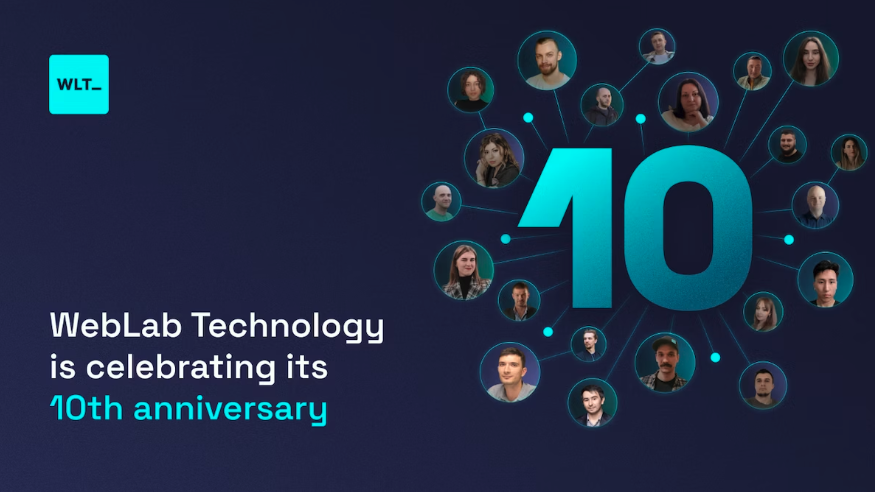
The last ten years have been significant here at WebLab Technology. We started our journey in December 2013 as a small team of developers on an outsourced project for a marketing company, a partner of Emaar Properties. The project was a request from one of the co-founders, now CTO and Solution Architect, who had just completed the implementation of indoor navigation kiosks for shopping malls.
Remote-first
At the beginning of the project, we rented an office room in a business center located in an industrial zone in one of the cities in Ukraine. After 6 months of work, we received additional funding from the client and needed more people to join the team.
It so happened that some of our team members were due to leave at the end of that year: one of the key engineers was moving to France, and the other was returning to Dubai. It was quite difficult to hire engineers with the right skill set, mainly because we were losing out to large companies in terms of office quality and space management.
But this is what led us to develop our remote-first hiring strategy. At the time, in 2014, it was our big competitive advantage because there was a significant pool of engineers who wanted to work remotely.
After this initial growth period, we realized that technical competence alone was no longer enough to make a hard-hitting team. Our remote-first approach necessitated engineers who could work autonomously were able to make decisions on their own and were ready to take responsibility for the result.
Dedicated Teams
We realized that working in the format of dedicated teams is the best approach for WebLab Technology. It means we can establish teams to work exclusively on projects for a particular company while also expanding its internal staff. This model has a number of important other advantages:
1. Full focus on client goals. A dedicated team focuses only on the needs of a specific client and is always available to respond quickly to solve their business problems. More than just being available, dedicated teams always show up and deliver for their clients, providing reliable, consistent execution.
2. Organic integration with the business. Our team fully adapts to the client’s corporate culture, following established rituals such as daily stand-ups, weekly planning, or progress-tracking meetings. We immerse ourselves in the company’s business objectives and choose the methods of cooperation that are most appropriate for them.
3. Ready (quick) access to expert knowledge in various fields — cloud technologies, front-end development, DevOps, etc. We help our clients find exactly the right specialists for their projects.
4. Ready to use patterns for performance. Young companies may not have the right culture or approaches, and methodologies to work with engineering teams. We know lots of ready-to-use techniques like proper Scrum, cultural patterns, engagement activities, etc.
5. Cost-effectiveness. The client pays only for the necessary functions, not for the maintenance of an additional office, equipment, hiring/recruitment, training, insurance, accounting, legal, taxes, etc. In addition, the team can be flexibly scaled up as needs change.
Eastern Europe offers a vast human resource pool that global companies can tap into. Moreover, Eastern European workers have very high and in-demand skill sets — sometimes higher than in Western countries — combined with comparatively lower wages. For example, the average salary of a Senior Software Engineer in Ukraine is $58k, in Poland — $60k, in Estonia — $64k. In the US, this figure reaches $145k per year for exactly the same skills and experience.
Therefore, working with Senior Dedicated Development Teams from Eastern Europe is an opportunity to get high returns and professional, motivated engineers at optimal prices — a mutually beneficial relationship for all parties.
Values that unite our team
Here at WebLab Technology, we have a strict set of values that inform every decision we make. But we did not form them in one day. Our values are a long evolutionary process that is still ongoing. Values let our teammates, clients, and partners know what to expect from us because when people share common values, it creates trust and predictability in relationships.
1. Open-mindedness: Always eager to learn and adapt.
- Humility: Embracing a modest self-assessment.
3. Respect: Upholding consideration and empathy for others.
4. Self-driven: Striving for excellence autonomously.
5. Honesty: Addressing issues with sincerity and courage.
6. Ownership: Treating each project as our own, ensuring its success.
Cooperation with Shaman as one of our turning points
Our dedicated development teams usually work in two formats: they extend the client’s existing teams but have a specific area of responsibility, or they are fully responsible for the entire R&D direction of the client company, as was the case with Shaman.
Shaman is one of our main clients that we are very proud to work with. The company’s technical component is fully implemented by WebLab. It is now an established business with customers among the world’s leading pharmaceutical corporations, such as Novartis, AstraZeneca, Takeda, Galderma.
Our collaboration with Shaman started back in 2015 with the idea of an iOS app for internal use to create smart canvas presentations. These presentations needed to be easy to adapt to the audience, sharable, and simple to design. The app has generated a lot of market traction, and it is now used by global enterprises around the world. It was on the basis of this application that we created a B2E SaaS company, which now employs more than 30 of our engineers.
Currently, Shaman is actively promoting its flagship product, ShamanGo, in the pharmaceutical market. In line with Shaman’s mission, the company seeks to empower Life Science Organizations’ content teams with the best no-code platform available, enabling them to create tailored content for healthcare professionals (HCP) in the most efficient way possible.
The recent shift of leading pharmaceutical corporations towards digital strategies has increased the demand for unique content. However, many of these companies do not have time to quickly create and manage huge amounts of information. This is where ShamanGo comes in — its users can generate high-quality omnichannel content in minutes by integrating with the leading platform Veeva. Thanks to close cooperation with Veeva Systems, ShamanGo has become the optimal solution for accelerating content production in the context of the digital transformation of the pharmaceutical industry.
Over our years of cooperation with Shaman, we have achieved certain successes that have shaped our work together. Some of our proudest achievements include:
● Scaled the team to 30+ engineers;
● Implemented Scrum and Scrum of Scrums to maintain consistency and motivation across our seven dedicated teams;
● Developed a strategy for advanced quality control (a vital concept in the B2E sector due to its demand for stability) and 99.9%+ uptime;
● Obtained SOC2 Type 2 certification;
● Created a global infrastructure in the US, Europe, and Asia Pacific
● Achieved a high level of infrastructure automation and quality control;
● Achieved top scores on the AWS Well-Architected Framework methodology;
● Supported the Veeva Technical Partnership Certification process;
● Launched a data-driven decision-making system;
● Implemented integration with various third-party platforms, including Salesforce;
AI-strategy
We believe that AI will change the world and so it is one of our main goals to stay ahead of the competition in this domain.
We started early work with AI in 2019, focusing on routing problems, multiple-objective genetic algorithms, and letters using computer vision. Today, we have more than ten successful AI cases in our portfolio.
We moved into more active integration of generative AI technologies into business processes in 2022. This has led us to focus on the development of AI agents and RAG solutions based on models such as GPT-4, Llma2, Stable Diffusion, etc. As in other industries, we can see the benefit AI could bring to software engineering and plan to embrace this change.
Our past projects include AI solutions for optimizing workflows in pharmaceutical companies. For example, we developed Magic Copy for Shaman, as an AI agent based on GPT-4 that generates optimized email templates following simple input instructions from a user.
Another successful case is the use of computer vision in the FoodTech database, which we designed for OllyFood. For this project, we implemented an automated quality control system for dishes and products based on image analysis.
The computer vision-based system analyzes images of dishes, identifies all ingredients, assigns quality scores, and detects up to 80% of deviations before the product reaches the customer.
We continue to actively develop AI solutions for various industries. Our goal is not only to keep up with technological progress but also to set trends and shape the future of AI.
Optimizing Engineer Teams with Data Lake Metrics: A Strategic Approach
Building effective teams that succeed is a difficult task in both sports and business. You may have watched the movie Moneyball, which shows how a baseball team manager started using analytical techniques to select players based on statistics rather than subjective impressions of scouts. This allowed him to build a competitive team with a limited budget.
In the IT business and software development teams, similar logic applies. We at WebLab Technology build a team and evaluate performance based on data and metrics, as this kind of information is a cornerstone of our industry.
One of the key approaches for us is measurement and automation at all levels: the company as a whole, teams, and staff roles.
For example, we have an automated management system that tracks the number of completed story points, planned scope of work, standard Scrum reports, the share of unplanned tasks and bugs, business value points, pull request sizes, code integration frequency, QA returned count, etc.
In addition to hard metrics, we also quantitatively analyze soft metrics: motivation, team atmosphere, and the realization of one’s capabilities. However, career advancement in the company mostly depends on the results of hard metrics.
Remote working gives us full digitalization and the ability to continuously track all processes in the company — from the work of engineers to customer satisfaction. We make our personnel and strategic decisions based on all this collected data and analytics we have at our disposal. We believe that the best results are achieved by combining technological and human factors.
Hiring slowly, hiring right: Why do we prioritize a thorough candidate search?
When it comes to hiring new employees at WebLab Technology, we avoid rushing things, even if it may delay the start of their work. In our opinion, accelerated recruitment creates significant risks in the long run, which almost always outweigh the potential short-term benefits. That’s why our hiring cycle is almost three times longer than the market average, and we pay a lot of attention to assessing the technical skills of potential senior developers.
The standard search for potential WebLab Technology candidates consists of 6 stages:
- Deep profile screening. We thoroughly review resumes and invite those who initially meet our requirements and have relevant skills.
- Selection challenge or project. Sometimes it’s called a homework assignment. Candidates undergo a specialized Selection Task that evaluates abilities for the specific role.
- Behavioral interview. The focus is on understanding how the candidate handled specific challenges or tasks in the past, aiming to predict their future performance.
- Coding interviews. Candidates showcase hands-on skills through coding challenges and sample projects.
- Domain/coding interview with leading engineer. The candidate is typically asked to solve real-world coding problems, demonstrate their coding abilities, and showcase their understanding of relevant technologies within the industry.
- System design interview with CTO. Our CTO assesses the candidate’s understanding of system design principles, their ability to make informed decisions, and their proficiency in creating scalable and efficient solutions.
For ten years, we have honed our ability to recognize the optimal combination of technical skills and the right human qualities, which allows us to expand our dedicated teams with truly motivated and professional engineers.
We are also open to hiring new specialists, especially AI Prompting Engineers. If you are an area specialist and think you are a match in terms of values and philosophy, we invite you to check out the vacancies on our website: https://www.weblab.technology/jobs
Technology and logic
We mainly work with B2B SaaS solutions that require solving specific business problems at scale and primarily focus on logic, functionality, and metrics rather than aesthetic visualization. We have worked with startups at different stages — in their earliest days and when they were in an active growth phase, building up their capacity and staff. Due to our flexibility, we adapt to the needs of our clients at any stage, regardless of the size of the startup and business model. In addition to startups, WebLab Technology has implemented complex solutions that require optimization and scaling for global enterprise companies.
Today, our main technical focus is on AWS, logic-intensive micro frontends, microservices, and AI. We also prepare our clients to pass standard certifications and audits and maintain a high level of quality in the areas of security and compliance. For example, we helped our client ShamanGo obtain the SOC 2 Type II certification.
Ten years
To celebrate the 10th anniversary of our company, we decided not to organize pompous offline events but instead to transfer our celebration budget of more than 10 thousand USD to the Kolo Foundation and support those who are now defending Ukraine and the rest of the civilized world.
“The Kolo Foundation is doing a great job. We’ve been cooperating with the foundation for a while now, and I think it’s the best use of our team’s celebration budget,” says WebLab Technology CTO and Solution Architect Oleksandr Knyga.
In 10 years, WebLab Technology has grown ten-fold. Today, our team consists of professional engineers working on products of varying complexity, and the company has in its portfolio such clients as ShamanGo, AstraZeneca, Novartis, Bryj (ex. FollowAnalytics), Emaar Properties.




